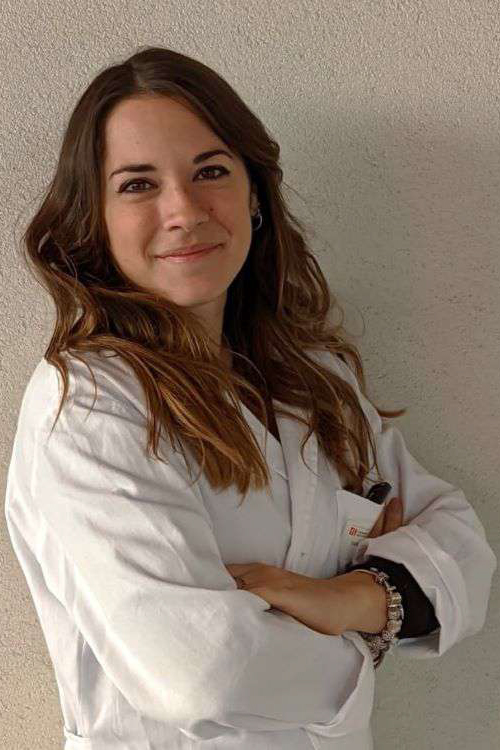
ORCID ID: 0000-0002-5009-3503
Curriculum: Experimental Neuroscience
Tutor: Professor Maria Foti
Supervisors: Dr Paola Cavalcante, Dr Davide Pareyson
Workplace: Fondazione IRCCS Istituto Neurologico Carlo Besta, Milan, Italy (Neurology 4 – Neuroimmunology and Neuromuscular Diseases)
I obtained a Bachelor Degree in Biology at University of Bari (Italy), Department of Biology, in 2016. Then, I worked at Hospital “Madonna delle Grazie” in Matera (Italy) for an internship of three months. I completed my Master degree in Molecular Biology at University of Parma (Italy), Department of Chemical, Life and Environmental Sustainability Sciences, in 2019. I carried out my Master thesis, about molecular analysis of A glycosyltransferase of ABO blood group, in the Immunohematology and Glycobiology laboratory (Fumiichiro Yamamoto’ Lab), at Josep Carreras Leukaemia Research Institute, in Badalona (Spain). During this period, I studied ABO and FORS blood groups in detail, in correlation with altered glycosylation in cancer cells. From 2020 to 2021 I worked as Junior Research Fellow at Istituto Nazionale dei Tumori, in Milan (Italy), in Tumoral Genomics Laboratory. Since 2021 I’ve been working in Neuroimmunology and Neuromuscular Diseases Unit (Paola Cavalcante’s Lab) at Fondazione IRCCS Istituto Neurologico Carlo Besta, (Milan, Italy), focusing on an immune-mediated neuromuscular pathology, Myasthenia Gravis (MG), deepening the roles of molecules involved in the pathogenesis of this autoimmune disease. After almost one year as Senior Research Fellow, I have been enrolled in the PhD Program of Experimental Neuroscience at the School of Medicine & Surgery of the University of Milano-Bicocca – UNIMIB (Monza, Italy). I’m carrying out the second year of PhD and my PhD project is specifically focused on the role of microRNAs (miRNAs) as pathogenetic factors, therapeutic targets and biomarkers in the disease, aimed to develop a personalized medicine in clinical practice. I performed oral and poster presentations about my studies on MG, at various national congresses and I was awarded for the best oral presentation in the Neuroimmunology topic, at the II Annual Meeting RIN (Rete IRCCS di Neuroscienze e Neuroriabilitazione), in 2022. In the same year I also qualified to the Biologist profession. Main activities I performed during this period are flow citometry analyses of MG patients’ peripheral blood mononuclear cells (PBMCs), immunofluorescence on tissues and cells, retro-miRNA, real time miRNA, miRNA isolation, RNA extraction from PBMCs, miRNome sequencing, in vitro assays, ELISA, next generation sequencing (NGS), DNA extraction from whole blood. I have competence with Microsoft Office programs, statistical softwares (e.g. GraphPad PRISM version 4.0), Flow Jo (for flow citometry analyses) and Data management and Data analysis. In 2024, I had the honor of translating in Italian an English book entitled “ABO+logy: Bioscience of the ABO blood groups for high school/college students and adults”, written by Dr. Yamamoto.
PhD research project
MicroRNAs as pathogenic factors, therapeutic targets and biomarkers in myasthenia gravis: towards RNA-based therapeutic approaches to counteract autoimmunity
Myasthenia Gravis (MG) is a prototypic B cell-mediated autoimmune disease whose clinical hallmarks are abnormal muscle weakness and early fatigability, mainly caused by autoantibodies against the acetylcholine receptor (AChR) of the neuromuscular junction. The thymus is the main site of autoimmunity development in MG patients, who mostly present thymic abnormalities, including follicular hyperplasia and thymoma. MicroRNAs (MiRNAs) play a crucial role in immune response regulation and indeed they have been implicated in several autoimmune disorders. Their expression profile is altered in MG peripheral blood mononuclear cells (PBMCs) and serum/plasma, suggesting a role of these molecules in the immune pathophysiology of the disease. Nevertheless, the exact contribution of miRNAs to the intra-thymic MG pathogenesis, and particularly their potential as targets of innovative treatments, have not been thoroughly investigated yet. The main goal of my project is to identify dysregulated miRNAs in the thymus and plasma of MG patients and reveal miRNA/mRNA target networks underlying the chronic autoimmune process, that could be targeted by novel effective molecular approaches to counteract autoimmunity. Whole miRNome sequencing was performed in MG and control thymuses revealing a number of miRNA/mRNA target pairs dysregulated in MG patients. To better understand the immunological function of the dysregulated miRNAs and the effects of their manipulation in immune system cells, functional in vitro studies on PBMCs were performed used individual miRNA mimics and inhibitors. The results deserve to be extended by further investigation aimed at deeply understanding the immunomodulatory effects of the identified miRNAs on immune system cell function, and hence their potential as possible novel targets of RNA-based treatments to counteract autoimmunity in MG and, potentially, other autoimmune disorders. Also plasma miRNAs will be disclosed as epigenetic personalized medicine biomarkers useful to tailor and monitor MG therapies.
Further info
-
Scopus Author ID: 57209690081
-
Research Gate profile